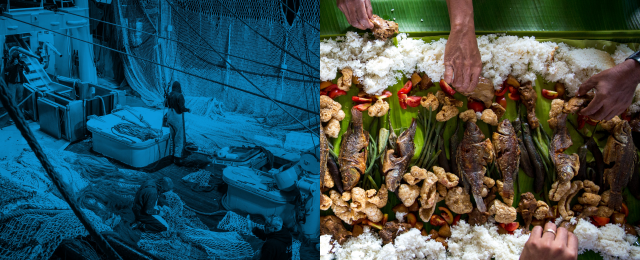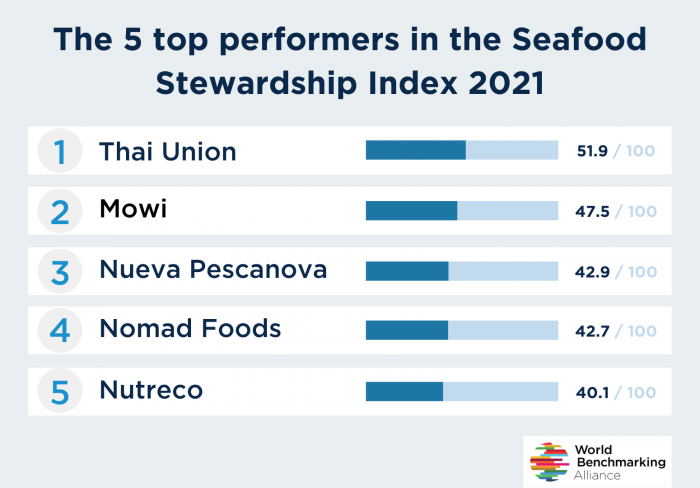See all results of the Seafood Stewardship Index
Seafood industry taking action on environmental issues but falling short on human rights

(Scroll down to read this content in Japanese)
London / Amsterdam, 12 October 2021: The World Benchmarking Alliance’s (WBA) has published its second Seafood Stewardship Index, presented today at Tokyo’s Sustainable Seafood Summit.
WBA’s research has revealed that seafood companies are not doing enough on human rights due diligence in the industry, despite making some progress on tackling environmental issues.
WBA’s data suggests that even for those seafood companies who do have commitments to protect human and labour rights, these are not translating into action. The majority (97%) of benchmarked companies lack a due diligence process – the most basic action that can be taken to start protecting their people. Only Thai Union Group, the number one company in the ranking, has demonstrated that it has a such a process in place to identify, assess and act on human rights risks and impacts in both its own operations and supply chain.
Moreover, of the 30 seafood companies assessed by WBA, only eight have commitments to monitor and ensure decent working and living conditions on-board vessels, a key issue in the industry, especially on distant water fishing fleets. Fishing is one of the most dangerous occupations in the world, so the health and safety of on-board workers must be made a priority for the industry.
Helen Packer, Lead Seafood Stewardship Index at WBA said:
It’s all well and good for companies to say they’re against practices such as forced-labour, but we need to see these words turn into action such as robust due diligence and grievance mechanisms to assess and address risks in both their operations and supply chain.
When it comes to environmental impact of fisheries and aquaculture, the Seafood Stewardship Index suggests that most companies are taking action, by trading products from sources that are certified or engaged in improvement projects. However, how much progress has been made is unclear due to imprecise reporting. For example, several companies do not disclose how much product is certified versus improving towards certification, which mean different levels of sustainability.
Detailed disclosure of companies activities across their entire portfolio is the only way to identify where improvements are most needed. If not, there is a risk they only focus on the low hanging fruit and leave behind the most challenging parts of the sector.
In this iteration, Thai Union retained its number one ranking, demonstrating leading practice on traceability and social responsibility topics. This year, the salmon giant Mowi leads the way on ecosystem impacts, with a 100% of its salmon products being certified sustainable and providing comprehensive reporting on key aquaculture issues such as responsible feed production and animal welfare.

Since 2019, together with other companies, Japanese companies have strengthened their commitment to traceability, the backbone to any sustainability and legality claims of seafood products. Three Japanese companies – Kyokuyo, Maruha Nichiro, Nissui – are members of the Seafood Business for Ocean Stewardship initiative which has pledged to work towards the adoption of the Global Dialogue for Seafood Traceability standards. The overall industry picture suggests more ambition is still required. Targets, while present, often lack a time frame and a little over a quarter of companies (26%) are yet to commit to traceability.
As an industry so dependent on healthy ecosystems, it makes sense that companies are investing in sustainability strategies” adds Packer. “We need clear reporting of progress and companies must be transparent about the complexity of the issues at hand. Only then can we have productive conversations about how to ensure a sustainable future for the industry.
The full findings and data of the Seafood Stewardship Index are available from today on our website here
– ENDS –
水産業界、環境問題には取り組んでいるものの、 人権問題への取り組みは不足
ロンドン / アムステルダム 2021 年10月12日: ワールド・ベンチマーキング・アライアンス(WBA)は、本日、東京サステナブルシーフード・サミットにおいて、第2回「シーフード ・スチュワードシップ・インデックス第2版」を発表しました。WBAの調査によって、水産会社の環境問題への取り組みは一定の進展を見せているものの、人権デューデリジェンスへの取り組みは十分でないことが明らかになりました。
WBAのデータは、水産会社が人権や労働者の権利保護への取り組みを約束していても、行動には結びついていないことを明らかにしています。ベンチマーク対象企業の大多数(97%)は、人権デューディリジェンス、即ち従業員の保護に踏み出すための最も基本的な行動に欠けています
適切な配慮に向けた手順・手続きを欠いています。ランキング1位のThai Union Groupだけが、自社業務とサプライチェーン双方において、人権に関するリスクと影響を見定め、評価し、それらに対処するための手順・手続きを有していました。
さらに、WBAが評価した水産会社30社のうち、水産業界、特に遠洋漁業船団にとっての重要課題である、船上での適正な労働条件・生活条件の監視・実現を約束しているのは8社にとどまっています。漁業は世界で最も危険な職業の一つであるため、船上労働者の健康と安全は業界の優先事項でなければなりません。
WBAシーフード ・スチュワードシップ・インデックスの責任者ヘレン・パッカーは次のように述べています。「企業が自分たちは強制労働などの行為に反対の立場だと公言するのは良いことですが、その言葉を行動に移さなければなりません。例えば自社業務・サプライチェーン双方においてリスクの評価・対処が実現されるよう
デューデリジェンス及び苦情対応のしっかりとした仕組みを整えることが必要です」
「シーフード ・スチュワードシップ・インデックス」によると、漁業や養殖業の環境への影響については大部分の企業が行動を起こし、例えば、認証品を取り扱ったり改善プロジェクトに取り組んだりする取引先から製品調達を行っています。しかし、報告が正確さを欠いているため、進捗具合ははっきりしません。例えば、認証取得製品の調達量と認証取得に向けて改善中の製品の調達量の二つを区別して公表していない企業が数社ありますすが、量により持続可能性のレベルは違ってきます。
最も改善すべき点をはっきりさせるためには、企業の業務全体における活動について詳細に開示するしかありません。そうでなければ、各企業が、簡単に成果が上がるところのみに力を注ぎ、業界の大きな難題がそのままにされてしまうおそれがあります

今回のランキングで引き続き第1位となったThai Unionは、トレーサビリティーと社会的責任の分野で優れた取組みを行っています。生態系への影響の分野で今年トップを走るのは、世界最大のサーモン養殖加工会社Mowiです。同社サーモン製品の100%がサステナビリティの認証を受けており、また養殖業界の重要課題である、責任ある飼料生産や動物福祉などについても包括的に取り組みを報告しています。
2019年以降、日本企業は他の企業とともに、水産物の持続可能性・適法性実現の土台を支えるトレーサビリティーへの取り組みを強化しています。株式会社極洋、マルハニチロ株式会社、日本水産株式会社の3社は、「Seafood Business for Ocean Stewardship(SeaBOS)」イニシアティブのメンバーです。同イニシアティブは「Global Dialogue for Seafood Traceability(GDST)」の採用に向けた取り組みを進めることを約束しています。業界全体を見渡してみると、今以上に意欲的な取り組みが求められます。目標はあっても期限が設定されていないことが多く、また、未だにトレーサビリティーに取り組んでいない企業が全体の4分の1強(26%)を占めています。
パッカーは続けてこう言っています。「水産業は健全な生態系に支えられる産業なので、企業のサステナビリティ戦略への投資は理にかなう投資です。今必要なのは、進捗状況に関する明確な報告であり、各企業は目の前の問題の複雑さに透明性をもって対処すべきです。そうして初めて、この業界の未来を確実に持続可能なものとする方法について、生産的に議論することができるのです」
「シーフード ・スチュワードシップ・インデックス」に関する結果及びデータ全文は、本日より当アライアンスのウェブサイトで公開されています:Seafood Stewardship Index – World Benchmarking Alliance(シーフード・スチュワードシップ・インデックス – ワールド・ベンチマーク・アライアンス)